A puppy spends most of its day playing, chewing, and exploring things. These normal activities include puppy play involving mouth and tooth use.
Puppies are adorable at first, but don’t let their cuteness fool you into thinking they won’t bite, chew, and mouth you if given half a chance!
It might be cute at first, but if your dog gets too big for his britches, it could become dangerous.
It’s very important to learn how to control the force of a dog’s bites. It's also important to puppy proof your home.
When there comes a time when they feel like putting their mouths on you or someone else, don’t be surprised if they start biting.
If they’ve learned bite inhibition (that biting down causes them pain), then they’ll know not to bite down too hard.
The best way to train a puppy is with positive reinforcement. The reward should always come after they have performed the desired action.
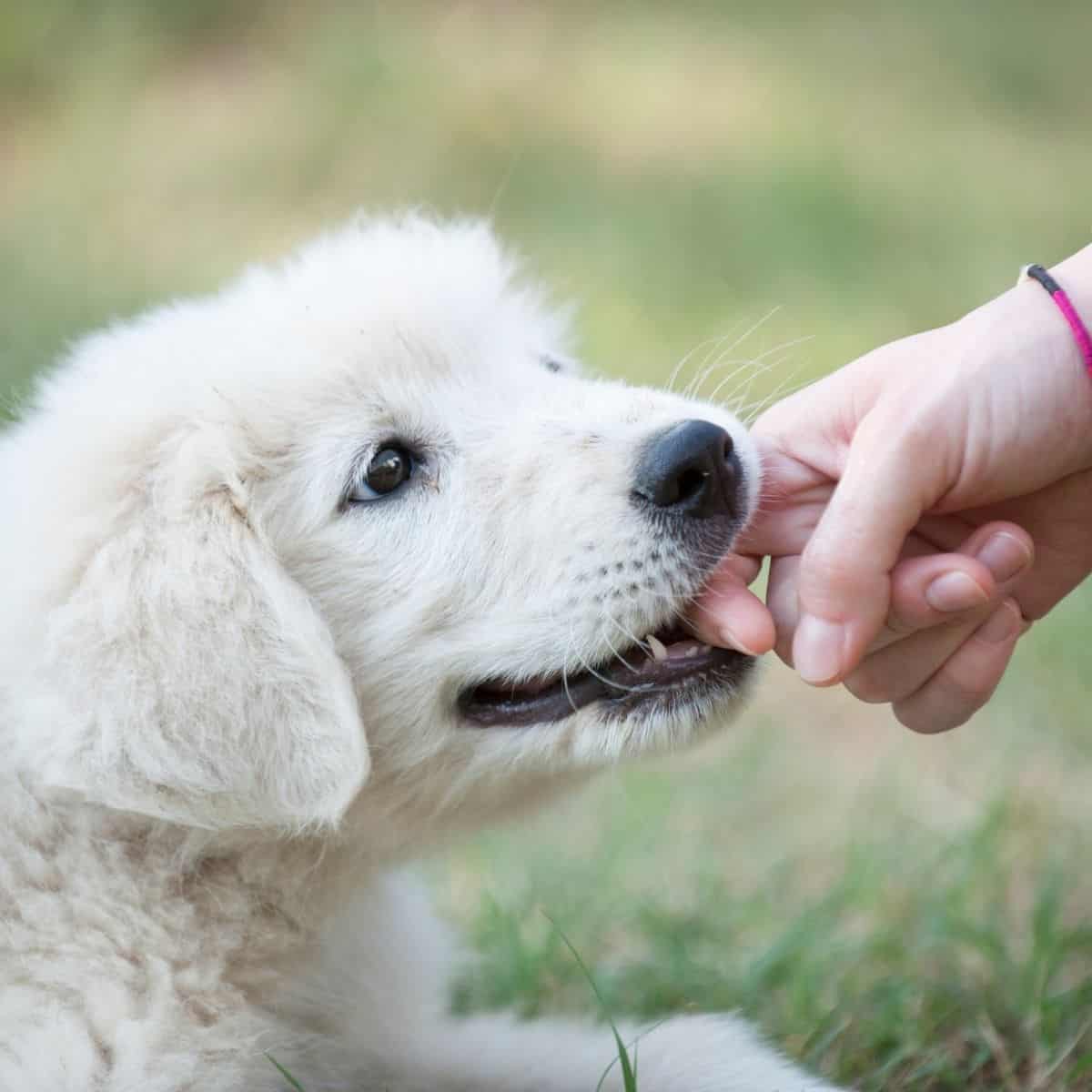
Why Do Puppies Bite So Much?
Puppies usually bite each other when they’re playing and exploring.
Just like humans, baby animals need to be exposed to new things so they know what’s out there.
Puppies are also going to bite anything they see when they’re teething.
Puppies wrestle when playing together. When puppies bite each other, one of them may cry out loudly, yipping to let the other pup know “that hurts!”
Puppy Teething Phase
Between 12-16 weeks, most puppies lose their baby teeth, their adult teeth emerge, you’ll likely notice some increased biting behavior.
As puppies grow into adults, their gums become sore when adult teeth come through.
How Puppies Play
A few pups may show an “approach” behavior by approaching another pup and nudging him/her with their noses; others may display a “nipping” behavior by biting another pup’s legs.
When puppies bite each other's tails, they learn a very useful lesson: not to bite their own tail!
Play biting teaches dogs how hard they can bite without hurting themselves.
- Let’s say puppies A and B are playing together. If they’re not fighting, then there won’t be any damage done.
- If puppy A hurts puppy B by biting too hard, puppy B may cry out and stop playing with puppy A.
- Then puppy B may even move away from puppy A.
- Puppy B learns through this experience that biting so hard makes other dogs not want to play with him.
- Puppy A doesn’t bite hard enough for others to notice, but he gets away with it because no one else wants him.
With some dogs, they’ll just know after one session; others might take several sessions to get there.
Disclosure: Some of the links in this article are affiliate links (Amazon Associate or other programs we take part in). As an Amazon Associate, I earn a small commission from qualifying purchases.
Why Puppies Bite
Biting things teaches dogs a great deal, including from other dogs, their owners, and even inanimate objects.
Sensory information helps them decide if they should continue biting an object or stop doing so.
Puppies usually keep biting things until they get tired out.
You may notice that when pups explore their new digs, they’ll often bite or chew on things like furniture, carpets, pillows, clothes, shoes, remotes, windows, doors, crates, beds, bowls, etc.
Teaching Your Puppy That Biting Hurts
Changing the force of a dog’s bites is extremely important for any dog owner. When they bite, there may be times when they’re in pain, afraid, or both.
If they’ve learned bite inhibition though, then they know not to bite down too hard. When puppies play together they often start by nipping at one another.
When puppies grow up, if they get bitten by another adult dog when playing rough, the pup may cry out loudly, saying, “Ouch! Stop biting me like that! It hurts!”
Depending on the dog, you can teach this by making a high-pitched “ow!” sound if they bite you.
Be careful though, because, for certain dogs, this may actually get them even more worked up than usual and they’re likely to start biting.
Here, it is better to walk away, or gently put the pup into their crate for a few minutes to calm down.
However, if they back off on their own, be sure to reward your dog with a treat and some verbal praise.
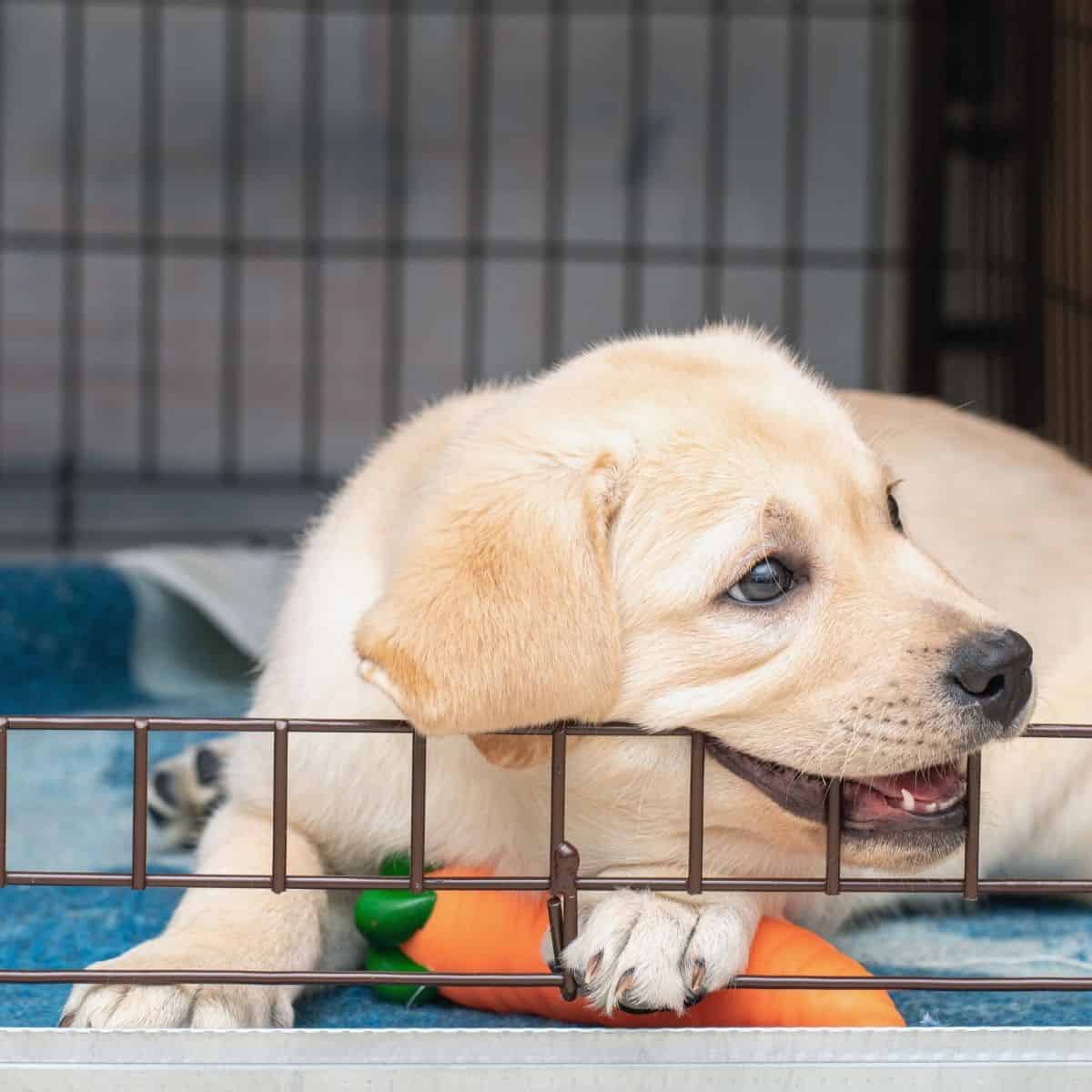
Teach Your Puppy That Biting Means No Playing
When your puppy bites you during playtime, that means playtime has ended; there are no exceptions.
As weird as it may sound, yelling at or physically hurting your dog when he misbehaves is actually rewarding him for doing so.
By yipping, it teaches them that biting gets some kind of response from you, which can be interpreted as positive punishment.
This can also make them afraid of being handled. Instead, teach them that biting will get them nothing.
The best suggestion is to simply turn around and tuck your hands into your armpits.
In fact, it’s a calming sign and a mild form of attention withdrawal. Be sure not to roughhouse with puppies when they’re small so they don’t learn bad habits like biting people.
How To Stop Your Puppy From Chewing Shoes
Keep giving your puppy different dog toys so he has plenty of things to play with. And be sure to keep any potentially dangerous objects out of his reach.
If you notice your dog chewing something inappropriate (like shoes), make sure he knows who’s boss by making some kind of sound. Then give him something else to play with so he doesn’t keep doing it.
Make sure that you schedule lots of play sessions and exercise times with your dog.
If you don’t provide them with enough mental stimulation, they might chew on anything just to keep themselves occupied.
How To Stop Puppies From Biting Your Hands and Feet
Don’t let your puppy nip at you by having them to play with your hands or toes.
As time goes by, your puppy’s teeth will become harder and sharper. Then puppy nips that were once harmless will become bites that aren’t so nice anymore.
If your puppy plays by biting when he wants attention, making a loud sound may help him learn not to bite.
Immediately, move away from your puppy or go into another room and close for a few minutes. This teaches them that playtime is over.
When your dog nips at you repeatedly, repeat this command until he learns not to bite.
If you don’t give him any positive reinforcement for biting gently, he won’t know how to stop himself from nipping at his playmate.
Why Punishing or Yelling Doesn't Work
If there are any instances where you’re worried about your pet chewing something dangerous like a medicine container, then teaching him/her to stop by giving out rewards instead could help prevent future incidents.
By pulling things out of your dog’s mouth can cause behavior issues to develop.
Positive reinforcement training methods are better than punishment for most dogs because they teach them right from wrong without having to punish them first.
In fact, that “guilt” look is actually a dog submissive position that dogs exhibit when they feel threatened or insecure.
Your dog doesn’t mind if you get mad at them; but when you yell, growl, and showing anger through your face, posture, and gestures, their fear increases, which makes them tense up.
Building and maintaining a healthy, loving bond between you and your pet is one of the best things you can do for yourself and your family.
Let's Talk About How to Stop Puppy Biting
When you walk into a room, the puppy that gives you most joy can become your most feared pet.
Dogs are pack animals and need to be socialized from the moment they are born.
Some puppies display inappropriate behavior that can be frustrating to deal with.
Let's talk about ways it would help if you can stop your puppy from nipping and biting.
Teach Your Puppy What It Means To Bite
Learning how to moderate the force of a bite is very important for all dogs.
There may come a time when they’re in pain or fearful, and they put their mouth on you or someone else. But if they’ve learned bite inhibition, they understand they shouldn’t bite down hard.
Puppies naturally nip at each other while playing.
- If they bite too hard on their mother or littermate, the other dog will probably make a loud yelp sound, warning the puppy, “Hey, that hurt!”
- Depending on the dog, you can teach this by making a high-pitched “ow!” sound if they bite you.
Beware, because, for some puppies, this actually gets them even more worked up and likely to bite. Here, it is better to turn quietly around, walk away, or gently put the pup into their crate for a few minutes to calm down.
If they back off, be sure to reward your dog with a treat and some verbal praise.
Alternate Chew Toys for Puppies
It’s a good idea to keep a puppy chew toy at hand at all times, so you can expect biting behavior and substitute the toy for your hand or furniture.
Doing so will let pups know what is OK to bite or chew. If they nibble at your fingers or toes while you’re playing, offer a toy instead.
Again, if they continue to nip, stop the play session immediately. If you’ve been training your puppy to sit, you might also redirect them by asking them to sit and rewarding with a toy.
Provide a Distraction
Puppies also like to mouth objects they see nearby. It’s mostly done for fun. You’ll find lots of different methods for teaching dogs not to chew on things like furniture.
Besides making sure there’s nothing dangerous in your house, be sure to provide some fun and safe chew toys for your puppy to enjoy.
For puppies, these toys should be chosen according to their level of chewing and destructivity. If she shreds a plushy toy in two minutes, then avoid giving your puppy soft toys.
Hide-and-seek toys are also great for keeping dogs distracted when they’re trying to nip. A dog’s toys provide her with both physical and mental stimulation by distracting her from boredom and providing her with something to think about.
You might arrange an activity like playing fetch with another puppy or having your dog interact with an older, vaccinated dog. Not only will this be helpful for socializing your dog, but they’ll also assist in training your pup is biting too hard.
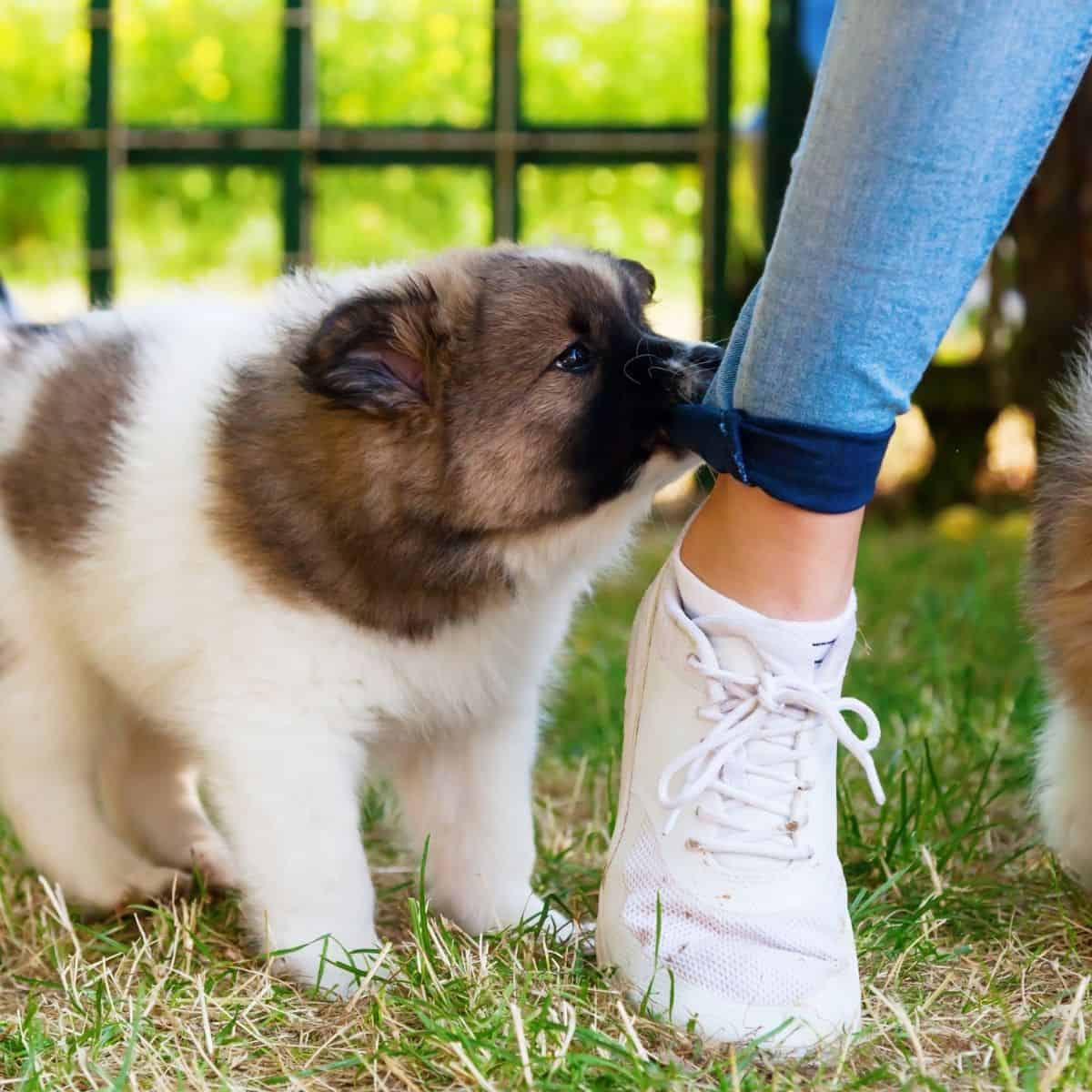
Those Pesky Ankle Biters
Many puppies start out by nipping at people’s feet or ankles as they walk.
To stop your puppy from nipping at your heels, keep a favorite toy or treat in your pocket.
- When your puppy bites at your heels, immediately stop and wave the toy or treat around to distract her until she latches onto it.
- If your puppy releases on their own, offer them a toy or a treat.
- Praise her for releasing from nipping at your heels. You want to train your dog so he understands that if he behaves well, then good things will come his way.
Final Thoughts: Stay Calm, Patient and Focused
Training puppies takes time, effort, and lots of patience.
Regardless of whether your puppy understands the lesson at first, be patient and keep training your puppy until one day they will finally pick it up.
If you shout at your dog or scold him when he misbehaves, you might scare him into behaving badly again. Instead, use positive reinforcement methods like praise or treats instead.
If you believe your dog is having trouble learning not to bite, then seek the help of a professional trainer.
With a little patience and a lot of consistency in your training, you can help your puppy stop biting and nipping before it becomes an issue and have a well-behaved family pet.

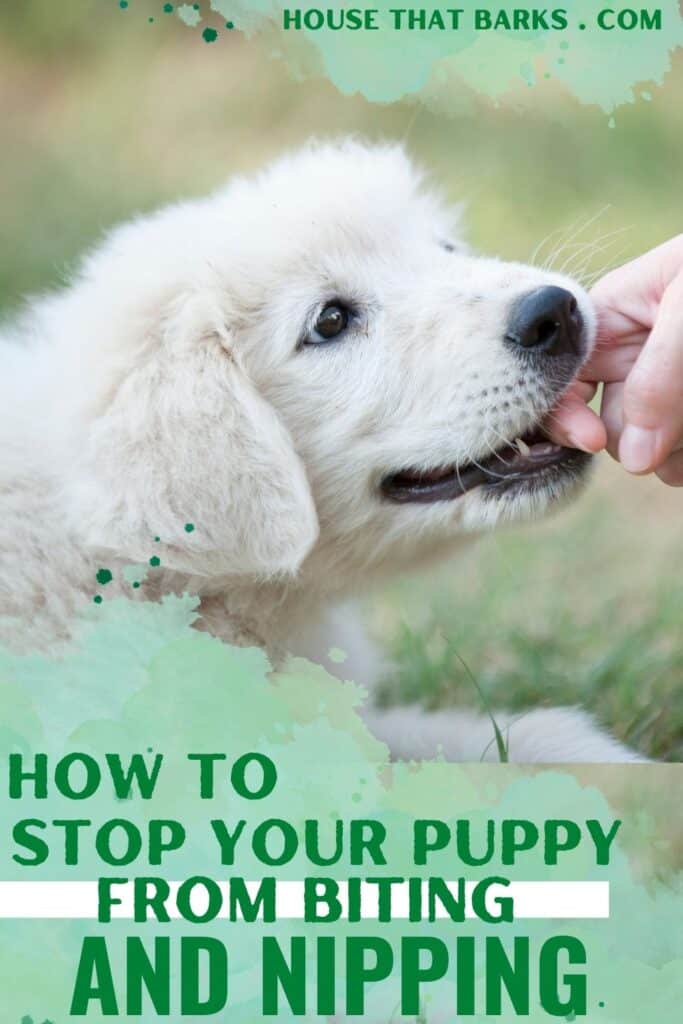
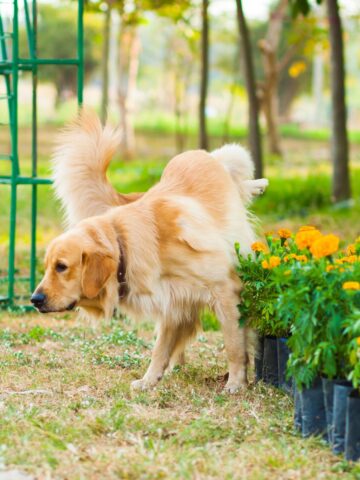
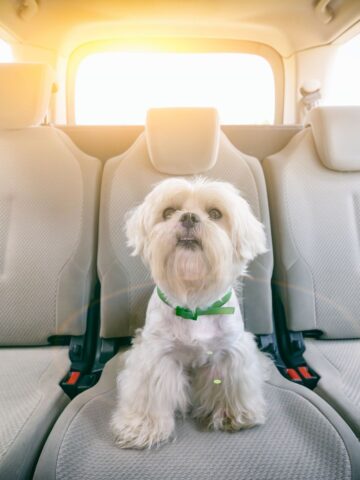
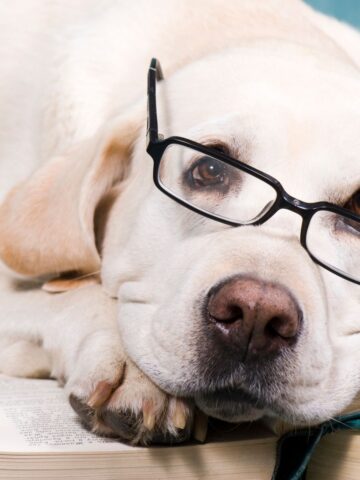
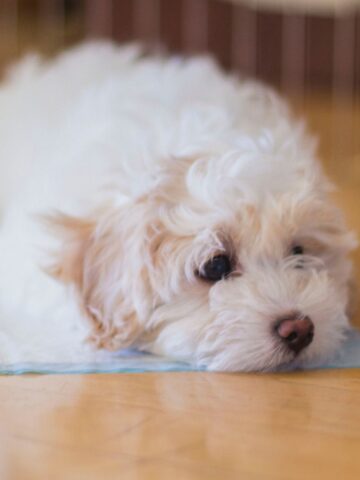
Leave a Reply